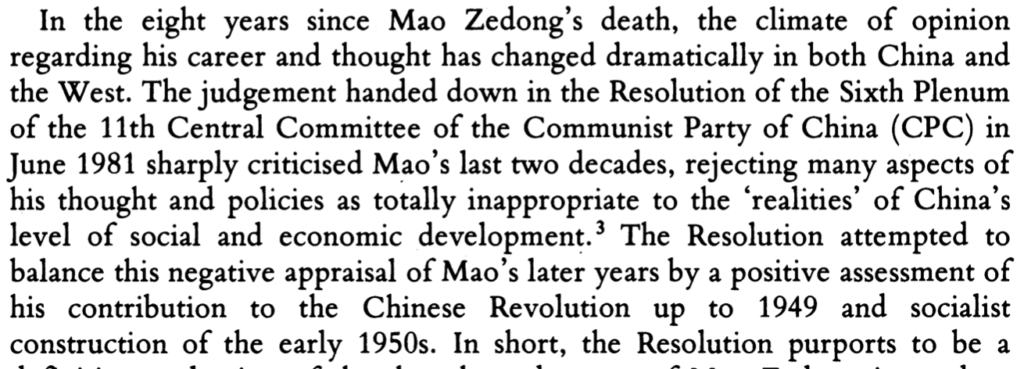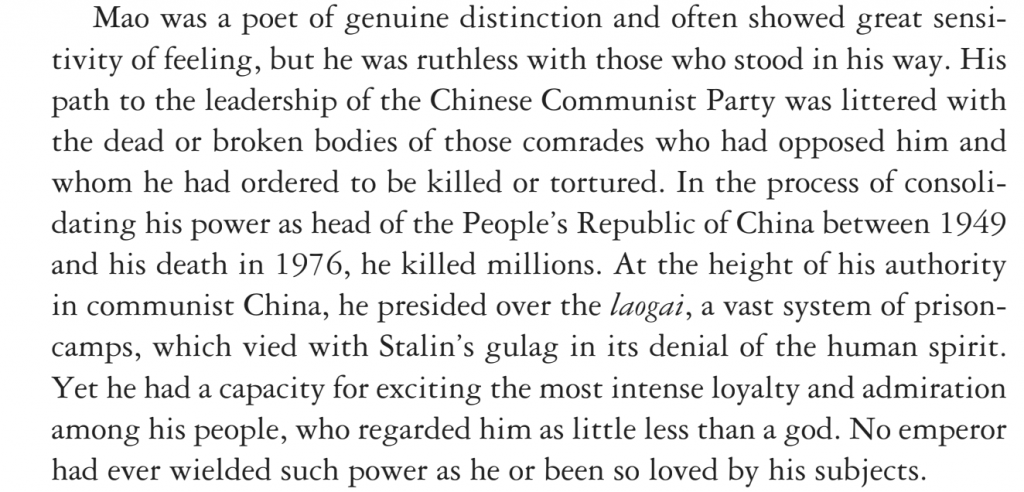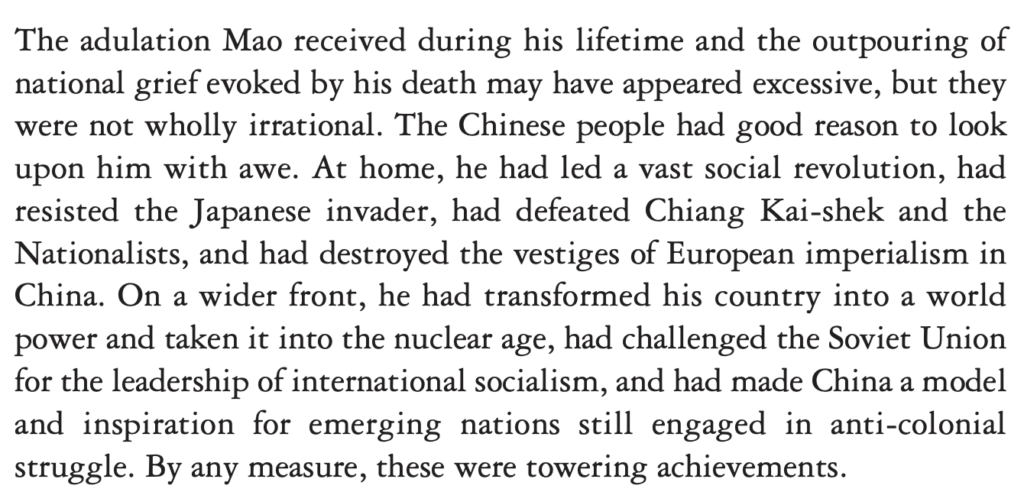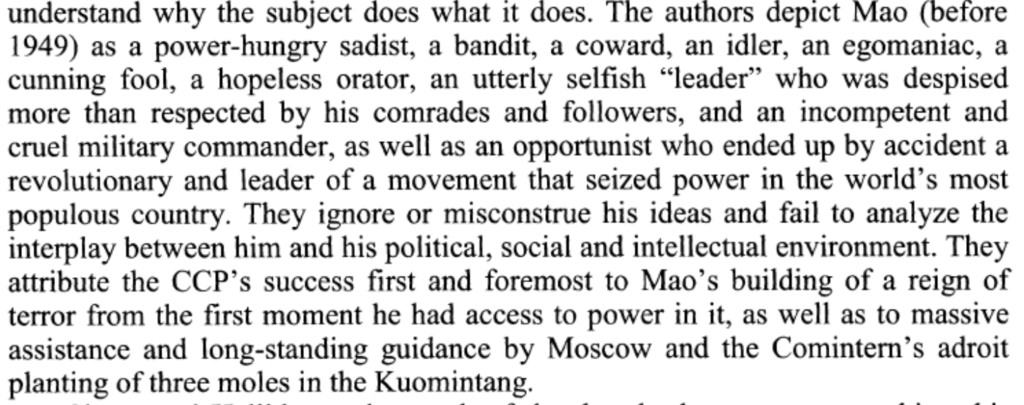- Historiography
- Michael Lynch
- Jung Chang and Jon Halliday
- Frank Dikkoter
- Mobo Gao
- Perspectives
- Thesis Statements
Historiography
Orthodox historians (Mobo Gao) generally argue the view that China was influenced by foreign capitalist powers for too long and Mao and CCP were successful in removing them.
Revisionist historians (Chung, Halliday and Dikotter) generally argue Mao was a tyrant who only ruled to serve his own ends and held China back economically and politically. These perspectives only surfaced after Mao’s death with Deng Xiaoping opening up
What does the following tell you about Mao and the historiography of him?

- In the run-up to the Beijing Olympics in 2008, the Chinese government opened some of the state archives to historians. As a result of these, first-hand accounts of the Great Leap Forward and Cultural Revolution were read and revised and even new theories put forward.
- If you are from the West, judging China is not easy because of the differences in culture. People in the West should try to avoid judging Chinese society and history from their own culture. Arguably, China is more deferential to elders
- China has had many languages within its history. Translating these into Mandarin or foreign languages can lose some of the meaning and therefore accuracy.
- China has undergone some liberalisation and relaxation since the death of Deng Xiaoping in 1997. (AlphaHistory) More balanced accounts of the Cultural Revolution were made available.
- When China was ‘friends’ with the USSR and Stalin, the Chinese Revolution was supported by communist countries. This changed after Khrushchev’s attack on Stalin in 1956 with relations between the two countries deteriorating.
- However, Marxist historians tend to be critical of Mao as he altered their ideology to suit his own needs. Arguably, he was only a token Marxist, some scholars arguing that Marxism was European and did not transfer easily to Chinese culture.
- But Maoist histories continue the ‘Great Man’ theory of him. Japan was defeated because of him and his party. The Hundred Flowers Campaign was a trap for his enemies rather than a strategic error. Mobo Gao – Historian – see below.
- Western historians, especially during the Cold War, would criticise Mao and argue that Jieshi was the true leader of China. Chinese involvement in the Korean War only added to this view. This only began to change after President Nixon visited Mao in 1972.
- Ross Terrill explains in Mao in History that the US viewed Mao as a junior Stalin until the 1960s when the Sino-Soviet split occurred. Even after 1972, Nixon and Kissinger tended to defend Mao and his attempts at social engineering rather than the excesses and errors of the Great Leap Forward. It was not until the Deng Xiaoping era that Mao was heavily criticised in the West. Evidence of this is that in the 1960s anti-communist scholar Richard Walker put the death toll of the Great Leap Forward at one to two million. Only in 1996 did Jasper Becker put the loss of life at thirty million, a more accepted figure today.
- Terrill explains that as the West is developing more relationships with China, there are more studies done. Previously, to be blunt, China did not matter very much.
- He also argues, with evidence to support his point, that Mao was under the influence of drugs when making decisions. These were usually sleeping pills but led to his erratic behaviour and sometimes slurred speech. For example, Mao refused to allow the US table-tennis team into China in 1971. But during one night when he was heavily drugged he changed his mind.
- However, in the 1930s and 1940s, when fighting Japan, books such as Edgar Snow’s Red Star Over China encouraged people in the west to view Mao positively.
- But in the late-1960s and 1970s student revolutionaries would shout his name and in South America and Southeast Asia, guerrilla movements would study his work.
The issue of Mao’s rule and legacy remains today. Watch the debate below.
Michael Lynch


But Lynch balances his explanation above by arguing the deaths, between 50 and 100 million, caused the failure of the Great Leap Forward and during the Cultural Revolution were equally monumental. The figures were so staggering that for a long time Western scholars could not believe them. Lynch argues that Mao ‘cleansed’ the population for what they thought (rather than who they were under Hitler).
His explanation for why this happened was,
- The foreign influence on China, it is important to acknowledge that Mao was in poverty in his teenage years and blamed them, and the acquiescence of the Qing dynasty, for this.
- Mao did not see himself as cruel with the violent policies and acts he instigated in China. Qin Shihuang had united the country in the third century using violence and Mao merely copied his methods. ‘Great rulers are realists who know that troubled times necessitate violent means.’
Jung Chang and Jon Halliday
- Revisionist historians have been critical too, arguing that his megalomania and vanity led to huge amounts of violence and suffering within the country. Jung Chang – Historian , published Mao: The Unknown Story in 2005. It portrays him as evil although it caused controversy as it is seen to be too one-sided (see screenshot below).

Furthermore,
- David S G Goodman, at the University of Sydney, observes that Chang and Halliday are predisposed to write “a demonography—there is to be not anounce of good behavior, not a scintilla of high purpose, to be found”.
- Gregor Benton (Cardiff University), Steven Tsang (Oxford University), and Timothy Cheek (University of British Columbia) see a similarity between Chang and Hallidays approach to Mao and the vilification of political enemies that was typical of the Great Cultural Revolution.
The book remains banned in China (although this does not stop everyone from access) and even in Taiwan it is difficult to acquire it, such were the criticisms of some GMD leaders.
But the book by Chang and Halliday became a bestseller, especially in the West, so could be a view of Mao that many across the world may have.
- In The Sunday Times, Simon Sebag Montefiore called the book ‘a triumph … a barrage of rev isionist bombshells, and a superb piece of research’ and concluded that ‘Mao is the greatest monster of them all
- In The New York Times Book Review, Nicholas Kristofwrote: ‘Based on a decade ofmeticulous interviews and archival research, this magnificent biography methodically demolishes every pillar of Mao ‘s claim to sympathy or legitimacy
Mao: The Unknown Story – Chapter Summaries
Key conclusions from the book include:
- Mao was not a founding member of the Chinese Communist Party
- It was not Mao’s genius and tenacity which allowed him to successfully manouevre the Long March, he escaped becaue Jiang Jieshi allowed him to.
- Much of his power and achievements came from the Soviets. He would not have been successful without their intelligence, military and financial assistance pre-1949, and their technical assistance was required for China’s military and nuclear programme to be developed.
- Mao may have made a deal with the Japanese during their occupation so both they and the CCP could focus on destroying the GMD.
- Mao ruled with terror throughout his reign. Even those seen as close to him feared his wrath.
- One of Mao’s closest ‘friends’ was Zhou Enlai, he was his foreign minister and number 2 for much of his reign. When he developed cancer in 1972, Mao refused him treatment.
- 45 million people died during the Great Leap Forward and Mao only ended this economic policy because of pressure from other leading figues in the CCP (who he later denounced and punished during the Cultural Revolution).
- Mao wanted to spread ‘Mao Tse-tung Thought’ across the world and make himself the Communist leader after Stalin’s death. Giving aid, both food and monetary. was a huge part of this, giving away up to 6% GDP even when his own people were starving.
Frank Dikotter
- Frank Dikotter – Historian and his own website.
- Dikotter is very critical of Mao and judges him responsible for tens of millions of deaths. You can watch his lectures about the Great Leap Forward and the Cultural Revolution.
- According to Dikotter, ‘we’ know of 20th-century horrors because Nazi Germany fell (the Holocaust), Stalin died (Purges, Gulags, Holodomor ) and Japan (Rape of Nanjing) lost the Second World War. It is more difficult to find evidence to prove the horror of the Great Leap Forward because the communist party is still in power. He argues that forty-five million died between 1958 to 1962.
- He published several lengthy books about Chinese history, specialising in Chairman Mao. These include Mao’s Great Famine: The History of China’s Most Devastating Catastrophe (2011), The Tragedy of Liberation: A History of the Chinese Revolution, 1945-1957 (2014) and the Cultural Revolution: A People’s History, 1962-1976 (2017).
- A key value in Dikotter’s work is the extensive research he carries out. This is exemplified in a section of a book review (on Mao’s Great Famine) below.

Catastrophe, 1958-1962 by Frank Dikötter”, The China Journal , July 2011, No. 66 (July 2011), p. 156
- However, the same review identifies limitations within his work. He makes generalisations about all of China based on the provinces in which he was able to conduct research. Furthermore, Dikotter explains that consequences of the Great Forward were varied because there are regional differences in the power structures and the number of farms in a province. So how can this all of this be laid at the door of Mao?
- Finally, as Professor of Humanities at the University of Hong Kong, perhaps there is some bias against China in his works because of the recent fractured political relationship between the two.
Mobo Gao
- Although most of the Chinese mainstream are critical of the Cultural Revolution, Gao praises it for the progress made in education and health. He explains his own experiences living in China at the time.

- A criticism from the same book review is that the Gao’s ‘progress’ is not seen throughout China, there was little diversity and opportunity in many areas of the country. However…

- Importantly, Gao also heavily criticises the work of Chang and Halliday, calling out their academic weakness and historical dishonesty.
Perspectives
Rise to Power
- The CCP and Maoist historians would argue the ‘Great Man’ theory, Mao had the foresight to understand the military reality, the other leaders did not. The Long March would be a great example to prove this. Edgar Snow may argue the same; you could argue that his book proved very influential at the time and persuaded people across the world of Mao’s talents.
- The GMD could argue that without the growing influence of the Japanese in China, the CCP would have eventually been destroyed. The Long March was not a success and should have been the dying embers of the communists.
- Marxist historians could argue that the nationalists, supported by the middle and upper classes, were not able to take power because China was a peasant country, and they supported Mao.
- Intentionalists may argue that Mao saw the struggle of the Chinese peasantry and put forward plans to help their cause. Introducing land reform and preaching a more equal society would bring him the support he needed to become the leader of China.-
- Functionalists or Structuralists may argue that Mao came to power because the country was under-developed and the majority of the population, peasants, wanted change. The GMD had rampant corruption and the economy was struggling with inflation in the late-1940s; this may have convinced many to view the CCP as the solution to the country’s problems.
- Chang & Halliday, possibly along with some Western historians, would argue that Mao used force, violence and repression to gain power.
Consolidation and Maintenance of Power
- Frank Dikotter
Aims and Results of Policies
Frank Dikotter
Thesis Statements
A. Without Mao’s cult of personality, built up over decades, the Great Leap Forward would have been the end of his power.
B. Chairman Mao maintained his power through violence, both the fear and the practice of it.
C. Mao transformed Chinese society from a divided nation in 1949 to one largely loyal and dependent upon him.
